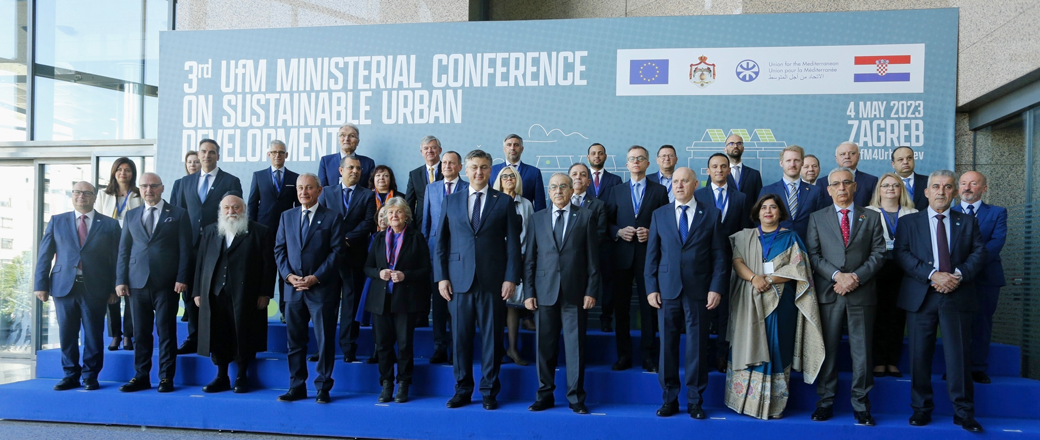
The ministerial conference convened ministers and other representatives from EU Member States and non-EU countries around the Mediterranean basin. European Commissioner for Cohesion and Reforms, Elisa Ferreira, co-chaired the meeting with Maher Hamdi Abuelsamen, Minister for Public Works and Housing of the Hashemite Kingdom of Jordan. Deputy Prime Minister of Physical Planning, Construction and State Assets of Croatia, Branko Bačić, and the Prime Minister of the Republic of Croatia, Andrej Plenković, hosted the event. Nasser Kamel, UfM Secretary General, ensured high-level representation from the organisation.
In addition to high-level delegations from 26 UfM Member States, the ministerial conference saw the participation of representatives from several partner organisations, such as the European Economic and Social Committee (EESC), the United Nations Human Settlements Programme (UN-Habitat) and the Euro-Mediterranean Regional and Local Assembly (ARLEM).
Participants had the opportunity to explore the Črnomerec district of West Zagreb, through a site visit to witness the urban regeneration of former military and industrial buildings. Representatives of the City of Zagreb and architects involved in the regeneration process served as their guides.
By adopting the declaration, ministers affirmed their continued, collective political support for the ongoing implementation of the UfM Urban Agenda, specifically the UfM Strategic Urban Development Action Plan 2040 and its Housing Action Plan, as strategic guidance documents for moving towards multilevel governance.
The UfM Strategic Urban Development Action Plan 2040, adopted in 2021, was presented to delegates by the European Commission and the Government of Jordan (UfM co-presidency). It was conceived in a collaborative effort between the Member states, the co-presidency, partner organisations, academia and other stakeholders, and complements and builds on the UfM Urban Agenda adopted in 2017. It is complemented by the Housing Action Plan as its first axis of intervention.
In their declarations, ministers echoed the principles of the action plans, with an emphasis on acknowledging common Euro-Mediterranean challenges. The main issues raised were the vulnerability of the Mediterranean region to climate change, the need for cross-border cooperation and knowledge-sharing, and the importance of ensuring the right to housing for all citizens. The high concentration of population, tourism, and the unstainable use of natural resources, were also raised as challenges facing the region.
UfM Member States highlighted the importance of cooperation and synergies between UfM action plans and international frameworks such as the UN’s 2030 Agenda and a wide range of EU initiatives. Cohesion policy, the Urban Agenda for the EU and the New European Bauhaus were some examples mentioned during the ministerial interventions.
Although challenges are common, ministers and representatives emphasised identifying place-based solutions to avoid one-size-fits-all approaches. In this respect, integrated territorial developments were consistently identified as the way forward for more impactful action at urban and regional level.
In her concluding remarks, Commissioner Ferreira stated: “This for me is confirmation of the role the Union for the Mediterranean plays in promoting our common prosperity on both sides of the Mediterranean”.
This high-level conference has given sustainable urban development in the Euro-Mediterranean area political momentum and will feed into the review of Sustainable Development Goal 11 (“Make cities and human settlements inclusive, safe, resilient and sustainable”), to take place at the High-level Political Forum (HLPF) in New York in July 2023. Indeed, delegations consistently referred to the role of the UN and the universal New Urban Agenda adopted by Member States in their interventions. The upcoming HLPF will provide an opportunity to showcase Euro-Mediterranean collaboration at UN level.
After the ministerial interventions and the adoption of the declaration, the conference continued with a presentation of the Urban Transitions Mission of Mission Innovation, co-led by the European Commission, the Global Covenant of Mayors and the Joint Programming Initiative (JPI) Urban Europe. The presentation, delivered by the director of the mission, outlined the project for net-zero, resilient and people-centred cities. The mission works with a cohort of 50 cities across the world, and helps cities revise and strengthen their climate plans and strategies to reap the benefits of systemic approaches to reach net-zero targets.
Finally, a high-level policy discussion was held under the theme “Rising up to regional challenges through national solutions: lessons learned and the way ahead”. Moderated by UN-Habitat Urban Practices Branch Chief Dr Shipra Narang Suri, the discussion allowed delegates from Croatia, France, Israel, Morocco and Egypt to discuss their practices. Issues raised ranged from new city projects and demographic challenges to densification and regeneration initiatives. They concluded that further efforts are needed to document these experiences for enhanced knowledge-sharing among UfM members.
The work of the UfM on sustainable urban development will continue through its dedicated regional platform and working groups, to follow up on the adopted declaration and action plans.
For further information please consult the dedicated page on the UfM Urban Agenda.